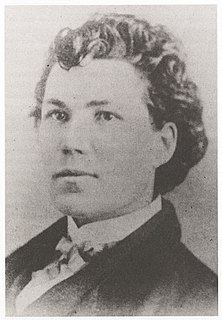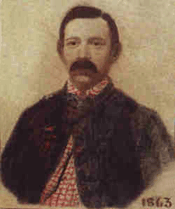 W
WAnderson Ruffin Abbott was the first Canadian-born Black Canadian to be a licensed as a family physician. His career included participation in the American Civil War. Significant roles included coroner of Kent County, Ontario, and surgeon-in-chief.
 W
WEdward Paul Doherty was an Irish-Canadian-American U.S. Civil War officer who formed and led the detachment of soldiers that captured and killed John Wilkes Booth, the assassin of United States President Abraham Lincoln, in a Virginia barn on April 26, 1865, twelve days after Lincoln was fatally shot.
 W
WSarah Emma Edmonds was a Canadian-born woman who served as a man with the Union Army during the American Civil War. In 1992, she was inducted into the Michigan Women's Hall of Fame.
 W
WBenjamin Jackson was a Nova Scotian who became a sailor, farmer, and decorated American Civil War soldier.
 W
WCalixa Lavallée was a French-Canadian-American musician and Union Army band musician during the American Civil War. He is best known for composing the music for "O Canada," which officially became the national anthem of Canada in 1980, after a vote in the Senate and the House of Commons. The same 1980 Act of Parliament also changed some of the English lyrics. A slight alteration to the English lyrics was made again in 2018. The original French lyrics and the music, however, have remained unchanged since 1880.
 W
WJoseph Benjamin Noil was a United States Navy sailor and a recipient of America's highest military decoration—the Medal of Honor.
 W
WWilliam Archibald Robertson was a prospector and Scottish-born political figure in British Columbia. He represented Victoria District in the Legislative Assembly of British Columbia from 1874 to 1875.
 W
WRobert Knox Sneden (1832–1918), an American landscape painter and a map-maker for the Union Army during the American Civil War. He was a prolific illustrator and memoirist documenting the war and other events.
 W
WJohn Taylor Wood was an officer in the United States Navy and the Confederate Navy. He resigned from the U.S. Navy at the beginning of the American Civil War, and became a "leading Confederate naval hero" as a captain in the Confederate Navy. He was a lieutenant serving aboard CSS Virginia when it engaged USS Monitor in 1862, one of the most famous naval battles in Civil War and U.S. Naval history. He was caught in 1865 in Georgia with Confederate President Jefferson Davis' party, but escaped and made his way to Cuba. From there, he got to Halifax, Nova Scotia, where he settled and became a merchant. His wife and children joined him there, and more children were born in Canada, which is where he lived out the remainder of his life.